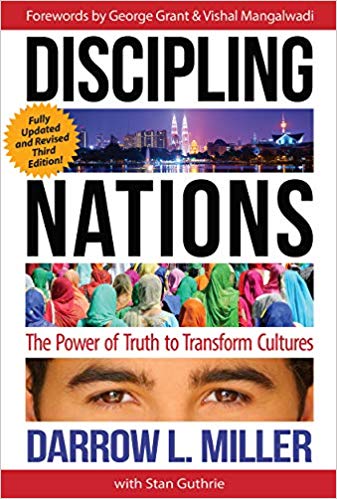At a Glance
Most of us have heard examples of when good intentions and generosity for the poor inadvertently led to more harm than good. But what’s the solution to this problem? How can you and I help those in need without causing them harm? This week’s guest, Dr. Brian Fikkert, co-author of the well-known book, When Helping Hurts and Founder/President of the Chalmers Center, joins us to respond to this vital question by introducing us to his newest book, Becoming Whole: Why the Opposite of Poverty isn’t the American Dream.
What You'll Hear
- Introduction (1:15)
- Brian’s background story (7:10)
- When was the first time you grasped the power of worldview? (15:36)
- How has worldview teaching has made an impact on your students and your ministry? (20:18)
- Why don’t most Christians understand their relationship to creation? (28:32)
- How can we encourage agency when serving instead of teaching dependency? (38:45)
- How do we share the message of When Helping Hurts with unbelievers running our impoverished cities? (47:20)
- How do we become whole in our four primary relationships? (57:08)
Dr. Brian Fikkert is a Professor of Economics and Community Development and the Founder and President of the Chalmers Center for Economic Development at Covenant College. He is coauthor of the best-selling book When Helping Hurts: How to Alleviate Poverty Without Hurting the Poor…and Yourself as well as Helping Without Hurting in Short-Term Missions, Helping Without Hurting in Church Benevolence, and From Dependence to Dignity: How to Alleviate Poverty Through Church-Centered Microfinance. Dr. Fikkert earned a Ph.D. in economics from Yale University, specializing in international economics and economic development. He is the author of numerous articles in both academic and popular journals. Prior to coming to Covenant College, he was a professor at the University of Maryland—College Park and a research fellow at the Center for Institutional Reform and the Informal Sector.
Using the link above, you can read the transcript, listen along, and adjust the speed of the podcast while you listen.
"Human beings are not just bodies. And we're not just bodies and souls. We're highly integrated Body-Soul relational creatures, and we're hardwired for a relationship with God to walk in deep fellowship with God."
Brian Fikkert (57:18)

Go Deeper
The Kingdomizer Training Program
More than a million people have now been trained in 115 countries.
Our Kingdomizer Training Program was first designed for missionaries, indigenous pastors, and workers in relief and development. As these individuals explored our basic biblical worldview teaching, they began to experience personal transformation that would ripple into their families, churches, communities, and even nations.
If you have a heart for the poor and a love for the Bible, we invite you to explore how you can be part of God’s transforming work in the world, and learn why thinking about a biblical worldview can make all the difference in people flourishing. Get started with our completely free Kingdomizer Training Program today!
Discipling Nations: The Power of Truth to Transform Cultures
Have Christians underestimated the power of God’s truth to transform entire societies? In Discipling Nations, Darrow Miller builds a powerful and convincing thesis that God’s truth not only breaks the spiritual bonds of sin and death but can free whole societies from deception and poverty. Completely revised and updated for the third edition, Discipling Nations will challenge, reenergize, and equip Christians everywhere who labor to see His kingdom come, His will be done.
Western Civilization is wealthier, but it isn’t happier.
We are the richest people ever to walk the face of the earth, but according to research, we aren’t becoming happier. Families and communities are increasingly fragmented, loneliness is skyrocketing, and physical and mental health are on the decline. Our unprecedented wealth doesn’t seem to be doing us much good.
Yet, when we try to help poor people at home or abroad, our implicit assumption is that the goal is to help them to become like us. “If they would just do things our way, they’d be fine!”
But even when they seem to pursue our path, they too find that the American Dream doesn’t work for them. What if we have the wrong idea altogether? What if the molds we are using to help poor people don’t actually fit any of us? What if the goal isn’t to turn other countries into the United States or to turn America’s impoverished communities into its affluent suburbs?
In Becoming Whole (building on the best-selling When Helping Hurts), Brian Fikkert and Kelly M. Kapic look at the true sources of brokenness and poverty and uncover the surprising pathways to human flourishing, for poor and non-poor alike. Exposing the misconceptions of both Western Civilization and the Western church about the nature of God, human beings, and the world, they redefine success and offer new ways of achieving that success. Through biblical insights, scientific research, and practical experience, they show you how the good news of the kingdom of God reshapes our lives and our poverty alleviation ministries, moving everybody involved towards wholeness.
With more than 225,000 copies sold, When Helping Hurts is a paradigm-forming contemporary classic on the subject of poverty alleviation and ministry to those in need. Emphasizing the poverty of both heart and society, this book exposes the need that every person has and how it can be filled. The reader is brought to understand that poverty is much more than simply a lack of financial or material resources and that it takes much more than donations and handouts to solve the problem of poverty.
While this book exposes past and current development efforts that churches have engaged in which unintentionally undermine the people they’re trying
to help, its central point is to provide proven strategies that challenge Christians to help the poor empower themselves. Focusing on both North American and Majority World contexts, When Helping Hurts catalyzes the idea that sustainable change for people living in poverty comes not from the outside-in, but from the inside-out.
The Chalmers Center
Together, we’re changing how Christians approach poverty alleviation–for good.
Quotes
- (26:22) “God has made you as a priest-ruler, to spread the reign and worship of God for the whole earth. And He wants you to do that right now in your village.” Brian
- (31:02) “the Garden of Eden was actually a temple… Not a temple in the sense of the building of a temple. But a temple is simply a place where God and humanity dwell together in deep communion, and what was going on in the Garden of Eden was – that was the place where God dwells. And so God’s everywhere. But He chooses to reveal Himself in particularly intense ways in certain locations.” Brian
- (32:29) “The imagery in Scripture suggests that Adam and Eve were priest-rulers in the garden temple, they were supposed to guard and protect it, but they’re also supposed to develop it through work.” Brain
- (32:49) “Work is what we’re called to do. But it’s not just so that we can eat. It’s certainly partly so that we can eat and that we can take care of our physical needs. But it’s more than that. You see Adam and Eve, as priest-rulers were to extend the knowledge of God’s presence and reign to the whole earth. And so there’s a sense in which the Garden of Eden was supposed to expand over the whole earth as Adam and Eve cultivated and developed it, and so suddenly work isn’t just a means to an end of getting stuff.” Brian
- (33:56) “Because in the biblical account, work is one of the primary means that we worship God. And so there’s meaning inherent to the activity of work. It’s worship, it’s spreading the reign and knowledge of God’s presence, the whole earth. It has incredible dignity and meaning and purpose. But we’ve lost that.” Brian
- (57:18) “Human beings are not just bodies. And we’re not just bodies and souls. We’re highly integrated Body-Soul relational creatures, and we’re hardwired for a relationship with God to walk in deep fellowship with God… He’s our Heavenly Father. He’s holding us close, we’re his beloved children, relationship with self, a sense of dignity and worth, not self-worth, but worth because God has called us His royal priesthood, His holy nation, we bear His image, we have dignity and worth not because we produce something, but just because of who we are–the pinnacle of the created order, relationship with others, deep communion, loving others, and being loved back by them. And then their relationship to creation, which we’ve talked about quite a bit already. It includes preserving and protecting the created order, but also unfolding and unpacking it through acts of work in service to God and humanity. And that’s what we’re wired for.” Brian







